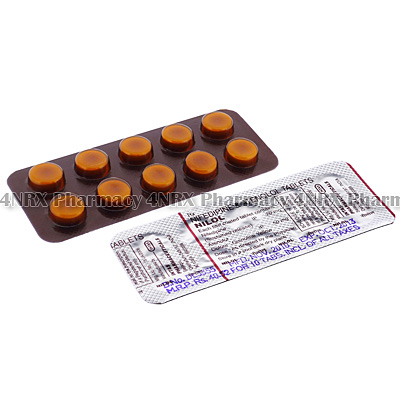 |
Home  Heart Heart  Nilol (Nifedipine/Atenolol) Nilol (Nifedipine/Atenolol) |
|
|||||||||
|
|
Nilol (Nifedipine/Atenolol)
What is Nilol (Nifedipine/Atenolol) used for? Nilol (Nifedipine/Atenolol) is an oral calcium channel blocker prescribed to treat patients suffering from angina or hypertension. The medication prevents the constriction of the blood vessels to reduce blood pressure and the amount of work required by the heart to pump the blood. This action may also make it useful for treating Raynaud`s disease. Your doctor may also prescribe this medication for the treatment of other unlisted conditions. How should I use Nilol (Nifedipine/Atenolol)? Nilol (Nifedipine/Atenolol) should always be used according to your doctor`s instructions to get the safest and most effective results from treatment. One tablet is normally administered once daily, but your individual directions will be based on your age, weight, health condition, and symptom severity. These should be swallowed with a full cup of water and may be taken on an empty stomach, although a meal or snack is suggested if you experience nausea. Do not alter the medicine by crushing or splitting the tablets as this may destroy or change the effects of their contents. Ask your pharmacist or doctor any questions you have about using the medicine to ensure the correct administration. What are the side effects of Nilol (Nifedipine/Atenolol)? The use of Nilol (Nifedipine/Atenolol) may cause side effects in some patients including:
Stop using the medication and contact your doctor immediately if you experience any serious side effects such as deterioration of angina symptoms, faintness, chest pain, trouble breathing, irregular heartbeats, unusual swelling, severe stomach pain, or jaundice. These conditions may require lower doses, reduced application frequency, or emergency medical attention in serious cases to prevent further health complications from occurring. Please Note Nilol (Nifedipine/Atenolol) should not be used to treat patients who are children, allergic to calcium channel blockers, who have had a bad reaction to similar treatments in the past, or who have unstable angina, aortic stenosis, cardiogenic shock, or who have recently had a heart attack. Also disclose if you have heart failure, porphyrias, hypotension, diabetes, left ventricular dysfunction, reduced liver function, or if you are undergoing kidney dialysis. These conditions may lead to unexpected health problems requiring special adjustments to your regimen. Strictly use Nilol (Nifedipine/Atenolol) as prescribed and follow all instructions provided by your doctor. Safe, suitable, and optimum dosage can vary and is dependent on the patient`s health and medical history, as well as the condition you are treating. Nilol (Nifedipine/Atenolol) may not be safe or suitable for all patients. Always ensure your doctor is informed if you are pregnant or breastfeeding, using any other type of medication (including non-prescription medicine, vitamins, and supplements), as well as if you have any allergies, other illnesses, or pre-existing medication conditions. Seek immediate medical attention or proceed to your nearest accident and emergency department if you suffer a hypersensitive or allergic reaction. Symptoms usually present during a reaction of this nature include difficulty breathing or swallowing, swelling of the limbs or face, tight chest, hives, and skin rashes. 
|
||||||||||||||||||